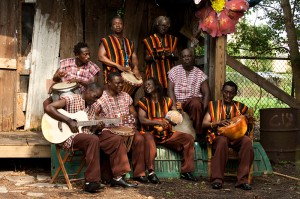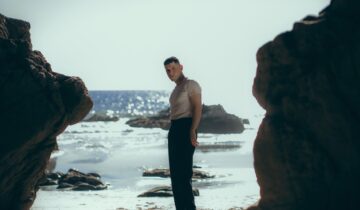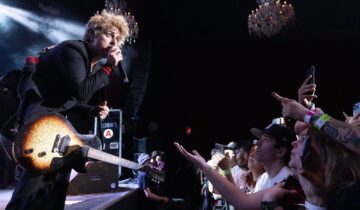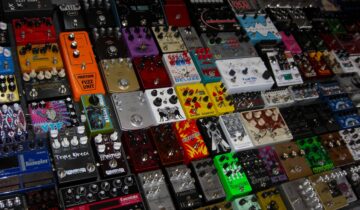 For SF Weekly: Since their humble beginnings playing songs to fellow refugees in a Guinea refugee camp during Sierra Leone’s civil war in the ’90s, the group of musicians that became Sierra Leone’s Refugee All Stars aimed to make music that could help people rise above difficult times. But to work, the music had to be authentic. It had to speak everyday truths to people displaced from their homes and families.
For SF Weekly: Since their humble beginnings playing songs to fellow refugees in a Guinea refugee camp during Sierra Leone’s civil war in the ’90s, the group of musicians that became Sierra Leone’s Refugee All Stars aimed to make music that could help people rise above difficult times. But to work, the music had to be authentic. It had to speak everyday truths to people displaced from their homes and families.
Since its return home in 2004, the group has toured the world and released three albums that have a consistent, distinct West African reggae sound but vary in tone. The first, Living Like a Refugee, features recordings from the actual refugee camps as well as some made in Freetown, Sierra Leone, after the civil war ended. The second album, Rise & Shine, produced by Steve Berlin of Los Lobos, features Trombone Shorty and other New Orleans musicians. Victor Axelrod of the Dap-Kings produced the third album, Radio Salone, in Brooklyn. The group’s newest album, Libation, shows a return to more stripped-down, campfire sounds reminiscent of their earlier work.
SF Weekly recently spoke with bandleader Reuben Koroma, 50, just after the World Health Organization had confirmed that the Ebola virus death toll had exceeded 1,200 during the virus’s worst-ever outbreak. Since we spoke, news reports have now confirmed that more than 2,600 people in Guinea, Liberia, Nigeria, and Sierra Leone have been infected and more than 1,400 have died.
SF Weekly: How are you, your bandmates, friends, and family coping with the Ebola virus outbreak?
Reuben Koroma, Refugee All Stars: We are all worried about the lives of our wives and children back home. Our visas expire soon, and we don’t really know what to do. It’s really dreadful. Going back home now is a big discussion. We’re trying to stay happy but we’re very concerned about going back home. Back home we get stories about people shooting their guns, and all this stuff. In the U.S., we can make money to send back to our people so they have something to eat, to keep them happy. We’re so thankful that none of our siblings or wives or children have contracted the disease.
Do you talk about the Ebola virus at your shows or is it too difficult?
I’ve written a poem about it. Sometimes we might get sad, but I want people to understand how we are feeling.
Your newest album, Libation, has a more acoustic feel similar to your early work. Why did you choose to do that?
Two reasons. We just want to really do something with the rhythms from our Sierra Leone, like the highlife and all these rhythms, and try to keep them awake and keep the music more rootsy. African music is our culture. We want people to know there are beautiful things coming from Sierra Leone. The rhythm of our country is so uplifting, we want people to know that.
Your music has a distinct West African reggae sound but there are other elements as well. Like what?
It’s the type of music I grew up with. Reggae is very similar to the traditional music I heard in the mid-’60s in alleys. It’s like ska or reggae, the downbeat. Like gymnastic-type sounds we call jolly, or similar to soukous (Congolese dance music). We also listen to James Brown, Kool & the Gang, and Michael Jackson. Sometimes on tours at festivals, we mix with other bands.
You and members of your group fled to Guinea during the Sierra Leone civil war [1991-2002]. What was it like when you arrived?
Guinea was the closest exit when the war came. When we got to the border, United Nations high commissioners were waiting for us. They said you have to register and go to the refugee camp. Camps were far away from the city, constructed in the middle of the forest. It’s a different world. The UN workers were taking care of us, always there to give assistance. They were trained for that, and welcomed us.
Some of you began performing together in the refugee camp. What were those early performances like?
Actually it was like people just cheering us on. Some people just came outside their place and sat down and just listened, staring, no response. But you can see in their eyes, they like it. We just had a small tape recorder and a small guitar. The war was happening, and people were highly frustrated. It was very difficult, but we kept doing it. People would clap, start dancing, and ask us questions.
What was it like returning home to Freetown in 2004?
It was a very good thing for me. Really an exciting thing for me to have a reunion with the bandmates we used to play with. I was so happy, and curious to visit my people, and also very curious to be back in my country. I was finally able to see my two daughters, my sister, and my friends, so I felt very good.
In the 2005 documentary about your band, you say, “I take all the problems of being a refugee and put it into song.” It must be tempting to channel lots of anger and negativity but your songs sound so positive. How do you do that?
I always think musicians have a responsibility to air out grievances of the people. I think of possibilities, but I think if people are sad, it’s not good to give them more sadness. I just thought that it’s better to bring some happiness and some uplifting. That’s the only cure. We have to play that.
Sierra Leone’s Refugee All Starts play the Independent September 10
Photo by Zach Smith, courtesy of the Refugee All Stars



